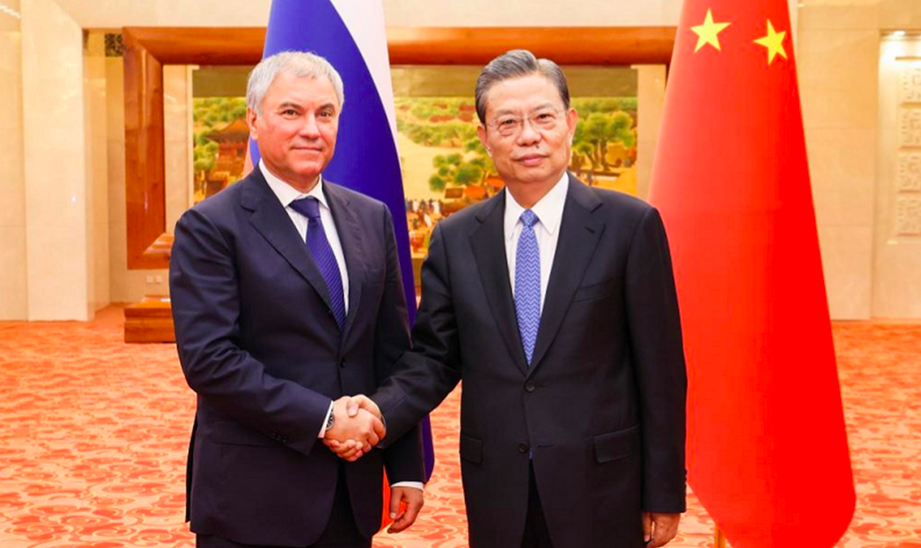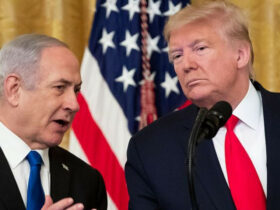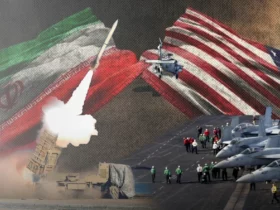By Edward Chesnokov *
Zhao Leji, chairman of the National People’s Congress Standing Committee, holds talks with Chairman of the Russian State Duma Vyacheslav Volodin at the Great Hall of the People in Beijing, capital of China, Nov 21, 2023. Photo: Xinhua
As a parliamentary correspondent, I accompanied the visit of the State Duma delegation to China from November 21 to 23, 2023. Every journalist should avoid exaggeration, but this trip was significant in every respect. The parliamentary dimension of Russia-China cooperation remained underrepresented, but now it has improved.
At the November 22 meeting with Chinese President Xi Jinping at the Great Hall of the People in Beijing, Chairman of the Russian State Duma Vyacheslav Volodin said that under the strategic guidance of President Xi and President Putin, Russia-China relations have reached the best level in history, noting that all parties in the Russian State Duma have a high degree of consensus on developing friendly relations with China.
The agenda about China, growing in every sense of the word, had been surrounding the State Duma members months before they departed from the Russian capital to Beijing. On every public TV screen in the Moscow city buses, you can watch funny clips of a lovely panda baby from the Moscow Zoo. Since its birth in August 2023, this tiny daughter of giant pandas Ding Ding and Ru Yi from China has opened her eyes and started to explore the environment.
Contrary to Moscow’s happy panda family, clips with skinny pandas from American zoos are circulating. For me, it is a metaphor for the current US-China and Russia-China relations.
Visiting the panda zone of the Moscow Zoo, I always see young people from China looking at their national symbol. Perhaps it would remind my grandfathers of the times of 1949-1955, when there were lots of Chinese students in Moscow as the Soviet Union was the first country to recognize the PRC.
During the meeting of Volodin and Chairman of the Standing Committee of the National People’s Congress Zhao Leji, the two sides called for enhanced exchanges between the legislative bodies of the two countries. Zhao said the China-Russia committee for parliamentary cooperation is a solid and effective platform for enhancing political mutual trust, promoting practical cooperation and carrying forward the friendship between the two peoples.
Now the relations between two natural neighbors have reached the level they deserve. One of the reasons for this is the unwillingness of the US-led West to recognize the changed reality and accept the multipolar world model. Trying to conserve its ending dominance, the US-led West imposed approximately 17,500 economic restrictions on Russia and Washington unleashed an unfair trade war against China.
Moreover, the US insulted Russian security by deploying its military bases in Eastern Europe – as well as Chinese security by raising tensions in the Pacific.
“Every generation has its own Long March,” this phrase from President Xi is well-known even in Russia. The Russia-China trade is about to reach $200 billion by the end of 2023. Ten years ago, in 2013, before the conflict with the West, trade between the two countries was just $89 billion.
China follows the historical truth. I was surprised to see the carefully treated monuments in Shenyang and Nanjing in honor of Soviet officers and soldiers killed in China’s War of Resistance against Japanese Aggression (1931-45) (the Nanjing monument was also visited by the State Duma delegation during its trip).
To improve economic cooperation, the neighbors need more interactors. Today, there are over 37,000 Chinese students in Russian universities (4,500 more than in 2021), and over 7,500 Russian students in Chinese universities. Nevertheless, “it is less than we need,” Volodin remarked in his Nanjing University speech.
Notably, it also was Volodin who signed the June 2, 2009 Agreement on Cooperation between CPC and United Russia, the ruling party in the country. At that time, he was the Deputy Duma Chairman and the Presidium Secretary of the United Russia General Council. Back then, it was not an easy decision – two decades ago, lots of pro-American experts in Russia called the West “non-alternative,” biasedly claiming China as “a threat.”
The baby panda from the Moscow Zoo has no name yet, it is still too young. But the current China-Russia relations could be easily described: the rising cooperation in all spheres for building a better world.
The author is an adjunct professor at the Far Eastern Federal University in Vladivostok, Russia.
This article was previously published on Global Times here.

















Leave a Reply